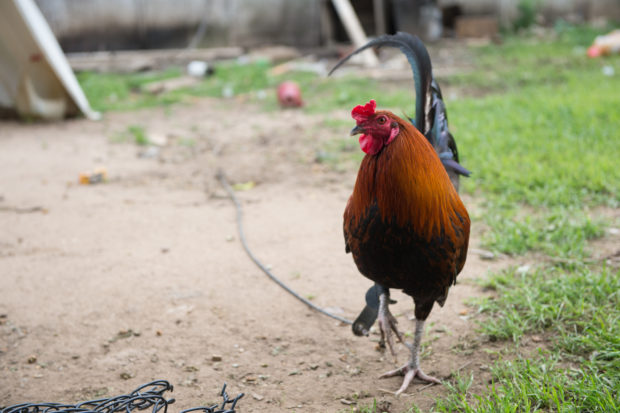
Animal fighting is the most widely criminalized form of animal cruelty in the United States, but ambiguities in the federal law have provided an opening for cockfighters to claim that it’s okay for this kind of staged cruelty to occur in U.S. territories. No longer if the PACE Act passes. Photo by Meredith Lee/The HSUS
When Hurricane Maria scoured the landscape of Puerto Rico, it killed people. It flattened and swallowed structures. It cut off power and left people in the dark and without refrigeration or air conditioning. It killed a lot of animals. We know, because our teams were there after the storm hit, providing humanitarian assistance and animal care, conducting animal transports, and delivering supplies.
One set of animals not accounted for are fighting roosters. Puerto Rico has become something of a refuge and a hub for American cockfighting, where a small subset of Puerto Ricans raise birds and participate in these bloody spectacles, often quite openly. There’s one cockfighting arena with theater-style seating inside and neon lights on the outside that you see when you drive to or from the San Juan airport. When the winds whipsawed the islands, and the storm surge flooded the coastal areas, an untold number of birds were killed. Typically, fighting roosters are extraordinarily vulnerable to predators and major weather events, because they are tethered outside to small A-frame huts or barrels, placed just far enough apart to keep the birds from inflicting wounds on each other. When a storm hits, especially if it’s a substantial cockfighting operation, there’s nowhere for the exposed and tethered birds to go. They face the elements, and that’s a fight they are almost certainly going to lose, especially when it’s a hurricane-strength storm.
The absence of a disaster plan for cockfighting birds is just one added reason to end the practice in Puerto Rico, whose people and animals have already suffered too much. It’s time now to end every form of staged animal fighting in every corner of our country, including Puerto Rico and other U.S. territories.
Today a bipartisan group of House lawmakers introduced legislation to upgrade the Animal Welfare Act’s provisions against dogfighting and cockfighting by clarifying that the territories of the United States are not exempt from the set of legal prohibitions against animal fighting. Reps. Peter Roskam, R-Ill., Earl Blumenauer, D-Ore., Rodney Davis, R-Ill., Rick Nolan, D-Minn., Kevin Yoder, D-Kan., Tony Cárdenas, D-Calif., Steve Knight, R-Calif., Brad Sherman, D-Calif., and Vern Buchanan, R-Fla. introduced the Parity in Animal Cruelty Enforcement (PACE) Act, H.R. 4202, to explicitly provide that federal prohibitions against animal fighting apply everywhere in the United States.
Dogfighting and cockfighting are sickening spectacles. When “dog men” stage fights between two powerful pit-bull-type dogs, they leave it up to the dogs to inflict lethal wounds with their teeth and their raw power. When it comes to “cockers,” they outfit the birds with metal knives, hard plastic spikes called postizas, or gaffs, and it’s those weapons that do the cutting and puncturing – with the animals confined in a pit from which they cannot escape. The result is punctured lungs, gouged eyes, and other grievous wounds that sap the life from the birds.
Animal fighting is the most widely criminalized form of animal cruelty in the United States, but ambiguities in the federal law have provided an opening for cockfighters to claim that it’s okay for this kind of staged cruelty to occur in U.S. territories. No longer if the PACE Act passes.
Puerto Rico’s citizens agree it’s time to end this animal cruelty. In June, a poll of 1,000 registered voters in Puerto Rico, conducted by Remington Research on behalf of The HSUS, revealed that among residents with a definite view of cockfighting, there was a two to one majority favoring a ban on the practice. Animal fighting is often associated with other crimes such as illegal drug dealing and human violence and with disease transmission risks. Citizens of the U.S. territories should not have to tolerate lower standards of animal welfare or community safety.
Since 2002, Congress has upgraded the federal law against animal fighting four times. Under current federal law, it is a felony crime to sponsor or exhibit an animal in a fighting venture; to buy, sell, deliver, possess, train, or transport an animal for fighting purposes; to use the postal service or other interstate means to promote animal fighting; to buy, sell, deliver, or transport cockfighting implements; and to bring a minor to an animal fight. It is a federal misdemeanor to be a spectator at an animal fighting spectacle. The prohibitions include any animal fighting activity that affects interstate or foreign commerce.
Culture is no defense for cruelty. Tradition is no defense for cruelty. We heard the same arguments when cockfighters in Arizona, Louisiana, and Oklahoma were trying to hang on to their bloodsport, before laws were strengthened to crack down on the brutal activity.
Today, a strong bipartisan group of lawmakers has taken a stand against cruelty to animals. Their colleagues should follow their lead.
The post New initiative in Congress takes aim at staged animal fighting in every corner of the U.S. appeared first on A Humane Nation.
Enviroshop is maintained by dedicated NetSys Interactive Inc. owners & employees who generously contribute their time to maintenance & editing, web design, custom programming, & website hosting for Enviroshop.
